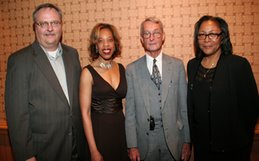John Edwards: On Issues of Race, War and Poverty in America, Silence is Betrayal – And Dreaming is Not Enough
Sunday, I was honored to stand in the very space where Dr. Martin Luther King, Jr. delivered his famous “Beyond Vietnam” speech 40 years ago at the Riverside Church in New York. With the full force of his conscience, his principles and his love of peace, King denounced the war in Vietnam, calling it a tragedy that threatened to drag our nation down to dust.
Today, the forces of war and poverty threaten the fabric of our nation again, and, as Dr. King put it then, there comes a time when silence is a betrayal -- not only of one’s convictions or country, but also of our deeper obligations to one another and to the brotherhood of man.
Dr. King’s call to service and to action couldn’t be more appropriate today. When Hurricane Katrina struck the Gulf Coast a little more than a year ago, we were all confronted with stark and vivid reminders of the enduring poverty that exists throughout America. I will never forget the faces and stories of the people I met when I toured evacuation shelters in Baton Rouge shortly after Katrina hit.
We saw Americans, largely divided by race, abandoned by their own government; a vivid depiction of the need for serious change to improve the lives of people living in poverty in this country.
And still, today, the situation is terrible. We must continue to demand accountability and press government leaders to do what's necessary to get hurricane-ravaged areas back on their feet. We should all continue to work together to ensure that America fully responds to the wake-up call delivered on Katrina's winds over a year ago.
But rebuilding from Katrina is only the beginning of what must be a national commitment to end poverty in America. The statistics are grave: African-American children are twice as likely to live in poverty as white children. Thirty-seven million Americans live in poverty, and 46 million live without health insurance -- many of them children. Lifting children up from poverty should have been our priority before Katrina; continuing to overlook it is our shame.
I often talk about the existence of two Americas -- one for the haves and one for the have-nots -- and Katrina exposed that for all the world to see. But that’s not the only lesson to come from the storm. There is an inspiring lesson that comes out of New Orleans as well, and it is this: The real power of America is in the people of America. Millions of Americans responded to Katrina with time, money, donations of food and shelter, and lots of hard work. In stepping up to take rebuilding into their own hands, they showed that we don’t have to wait for tomorrow to bring about the changes we believe in. We can start changing America today.
That’s what we did over the last year when, joined by thousands of others, we raised the minimum wage in six states because the federal government failed to act. And you know what? When people across the country take responsibility and take action, the government just might pay attention.
This week, the House of Representatives finally voted to raise the federal minimum from $5.15 per hour to $7.25, pulling millions of Americans closer to a living wage. Much more needs to be done. We need to guarantee universal health care, make housing more affordable and help people go to college. We must press on so that all Americans can share in the prosperity of our great country.
We see where we failed our brothers and sisters on the Gulf Coast and across this country, and we hope to do better. But hope alone is not enough.
We see the country we dream America to be. But dreaming is not enough.
We wait for things to change. But waiting is certainly not enough.
To solve these problems we’ve all got to be willing to go out and get our own hands dirty. To solve these problems, we’ve got to act.
In the end, it comes down to what Dr. King once called “life’s most persistent and urgent question: What are you doing for others?” What are we doing to strengthen this great nation of ours? What are we doing to give every American a chance to share in the great blessings of America? What are we doing to build a more secure and livable world?
In the end, we know these are the only questions worth asking -- and answering them is the only work worth doing. The world needs to see us doing it. And we’re going to do it, together, with our whole hearts.
Tuesday, January 23, 2007
Subscribe to:
Post Comments (Atom)

No comments:
Post a Comment